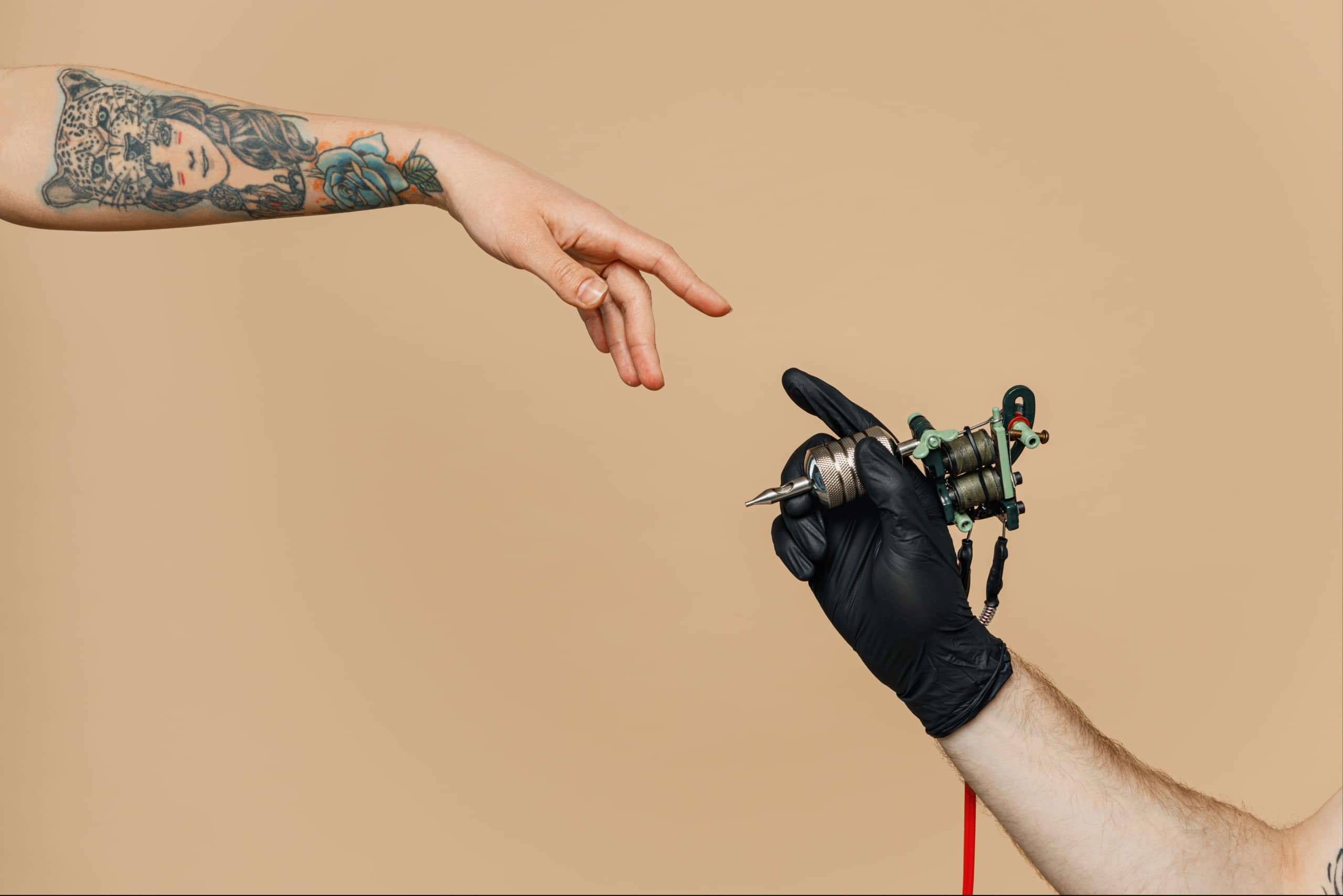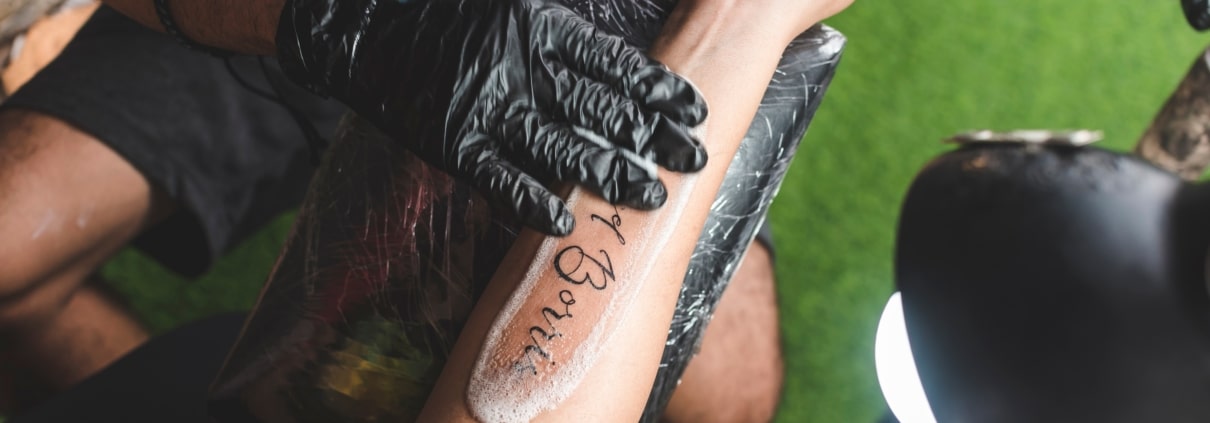Tattoo Aftercare: Can You Safely Use Neosporin?
Tattoos are a form of permanent art that require meticulous care to ensure they heal correctly. If you’ve recently gotten a tattoo or are planning to, you might be wondering, “Can you use Neosporin on tattoos?” With its reputation as a reliable antibiotic ointment, Neosporin might seem like an ideal choice to prevent infection and aid in the healing process.
However, before you reach for that tube of Neosporin, it’s important to understand how it interacts with your new tattoo and whether it’s truly the best option for aftercare.
What is Neosporin?
Neosporin is a widely used over-the-counter antibiotic ointment composed of bacitracin, neomycin, and polymyxin B. These ingredients work together to prevent infection by stopping the growth of bacteria in minor cuts, burns, and scrapes. For decades, it has been a go-to for treating everyday wounds and has gained a solid reputation in general wound care. But, when it comes to tattoos, a fresh tattoo is not just a wound—it’s a complex piece of body art that needs special treatment.
Purpose of Neosporin in Wound Care
Neosporin is designed to create a protective barrier over damaged skin, helping to shield it from infection while speeding up the healing process. It’s fantastic for scrapes and minor injuries, where it helps prevent bacteria from entering and causing further damage. However, a tattoo is much more than a simple cut or scratch. It is an intricate design involving layers of ink that need to settle into the skin as it heals. This is where Neosporin might not be the perfect solution.
Why Do People Consider Neosporin for Tattoos?

Many people instinctively reach for Neosporin after getting a tattoo because they want to avoid infection and help the area heal faster. Given Neosporin’s reputation as an antibacterial ointment, it’s no surprise that some believe it to be ideal for fresh tattoos. However, this logic can backfire, as there are significant downsides to using Neosporin during the tattoo healing process.
Tattoo Aftercare: The Basics
Tattoo aftercare is critical to ensuring that your new tattoo heals properly and maintains its vibrant appearance. Newly carved tattoos are essentially open wounds, meaning they are vulnerable to infection and damage if not treated with care. The objective of aftercare is to boost the healing process, reduce the risk of infection, and ensure the colors remain bright.
Most tattoo artists provide clients with specific instructions for aftercare, which typically include:
- Keeping the tattoo clean
- Moisturizing regularly
- Avoiding direct sunlight
- Wearing loose-fitting clothing
- Using a recommended ointment or cream
Why Aftercare Products Matter?
The products you select for aftercare play an important role in the healing process. While it might be tempting to reach for a household antibiotic ointment like Neosporin, it’s important to know how it may affect your tattoo. Some ointments can trap moisture or cause allergic reactions, both of which can lead to complications with your tattoo.
Related Article: What is the Best Tattoo Aftercare Routine?
Can You Use Neosporin on Tattoos?
Many people assume that because Neosporin works wonders on minor cuts and scrapes, it will also help heal tattoos. Neosporin is an over-the-counter antibiotic ointment used to prevent infection in small wounds. It contains ingredients like bacitracin, neomycin, and polymyxin B, which help kill bacteria and promote healing.
However, using Neosporin on tattoos is not always recommended by tattoo artists or dermatologists. Here’s why:
Potential Side Effects of Neosporin on Tattoos
- Allergic Reactions: Neosporin contains neomycin, a known allergen that can cause contact dermatitis in some individuals. This can lead to red, irritated skin, itching, or even swelling, which could compromise the tattoo’s appearance.
- Thick Consistency: Neosporin is thicker than most tattoo aftercare products, which may prevent the skin from breathing. Tattoos need to breathe to heal properly, and an overly thick ointment can trap bacteria under the skin, leading to infection.
- Excessive Moisture: Neosporin creates a moisture barrier that can be problematic for tattoos. While keeping the area moisturized is essential, too much moisture can slow down the healing process and potentially damage the ink.
- Fading of Tattoos: Some users have reported that Neosporin can cause tattoos to fade or even lose ink during the healing process. This might be because the ointment’s thickness interferes with the skin’s natural ability to restore and preserve the tattoo.
Related Article: Painless Tattoo Cream: What Are the Side Effects and Is It Worth It?
Best Ointment for New Tattoos
Instead of using Neosporin, it’s better to use products specifically designed for tattoo aftercare. These are the few best ointments and creams for healing tattoos:
1. Tattoo-Specific Ointments
Numerous tattoo aftercare ointments are specially made to promote healing without compromising the tattoo’s appearance. These products are lightweight, moisturizing, and designed to keep the tattoo clean. Some popular options include:
- Aquaphor Healing Ointment: A widely recommended product that provides moisture without suffocating the tattoo.
- Hustle Butter Deluxe: A natural, vegan option that helps nourish and protect the skin.
- Tattoo Goo: A blend of herbs and natural ingredients that aid in healing while preventing infections.
2. Fragrance-Free Lotions
After the initial healing stage, many tattoo artists recommend switching from ointment to a fragrance-free lotion to avoid irritation. Look for products like Aveeno or CeraVe that are gentle on sensitive skin.
Related Article: What Is The Best Lotion To Use On A New Tattoo?
Tattoo Infection Prevention
One of the primary issues with tattoo aftercare is preventing infections. Fresh tattoos are vulnerable to bacteria, and infections can cause serious problems, like scarring and loss of ink. While Neosporin is often thought to prevent infections, there are better ways to protect your tattoo.
Tips to Avoid Tattoo Infections
- Keep It Clean: Wash your tattoo gently with antimicrobial soap and water. Avoid scrubbing or using harsh chemicals.
- Use the Right Ointment: As mentioned, tattoo-specific ointments are best for keeping the area clean without causing irritation.
- Avoid Touching: Keep your hands off your tattoo as much as possible, and make sure to always wash your hands before applying ointment or lotion.
- Wear Clean Clothing: Wear loose, breathable clothing that won’t rub against your tattoo or trap moisture.
Related Article: Caring for an Infected Tattoo: Steps to Get Healed
Neosporin Tattoo Healing: Is It Ever a Good Option?

While Neosporin is not typically recommended for tattoos, there may be some exceptions. If you notice signs of infection, such as redness, warmth, or pus, it’s important to consult a healthcare professional. In some cases, they may recommend an antibiotic ointment to treat the infection.
However, for regular tattoo aftercare, it’s best to stick with products designed specifically for tattoos.
When to See a Doctor
If your tattoo becomes excessively swollen, painful, or starts showing signs of infection, seek medical attention. While minor irritation is normal, persistent or worsening symptoms should not be ignored.
Related Article: Neosporin On Tattoo For Aftercare: When To Avoid It And When To Use It
Petroleum Jelly on Tattoos: Is It Safe?
Another common question is whether petroleum jelly (like Vaseline) is safe for tattoos. While petroleum jelly has its uses, it’s not ideal for fresh tattoos. Similar to Neosporin, petroleum jelly is too thick and creates a barrier that traps moisture, which can lead to infections or slow healing.
Most tattoo artists recommend avoiding petroleum jelly and using a lighter, more breathable ointment instead.
Related Article: Tattoo Sunscreen and Other Sun-Safety Tips to Protect Your Body Ink
Final Thoughts:
Proper tattoo aftercare is crucial to preserving your tattoo’s vibrant appearance and ensuring a smooth healing process. Although Neosporin might seem like a convenient option, it’s better to choose tattoo-specific aftercare products that won’t risk your ink fading or blurring. Always follow your tattoo artist’s recommendations, keep your tattoo clean, and apply the right ointments to protect your new artwork.
For expert advice on tattoo care or if you’re looking for a professional studio for your next tattoo, visit Oracle Tattoo Gallery. Our skilled team excels in creating custom tattoos and offers comprehensive aftercare guidance to help you heal your tattoo safely, maintaining its beauty for years to come.
FAQs
Can I use Neosporin on a new tattoo?
Most of the time it’s not recommended to use Neosporin on a newly printed tattoo due to the risk of allergic reactions, fading ink, and excessive moisture that can slow healing.
What is the best ointment for tattoo aftercare?
Tattoo-specific ointments like Aquaphor or Hustle Butter Deluxe are often recommended by tattoo artists for optimal healing.
What can we do to prevent your tattoo from getting infected?
Keep your tattoo clean by washing it with antimicrobial soap, using recommended ointments, and avoiding touching it with unclean hands.
Can I use petroleum jelly on my tattoo?
Petroleum jelly is not recommended for fresh tattoos because it traps moisture and can interfere with the healing process.
What can I do when my tattoo causes an infection?
If you see signs of infection, such as swelling, redness, or pus, seek to find a doctor right away for guidance and treatment.
When can I stop using ointment on my tattoo?
After the initial healing phase (typically around one week), you can switch from ointment to a fragrance-free lotion to keep the area moisturized.




Leave a Reply
Want to join the discussion?Feel free to contribute!